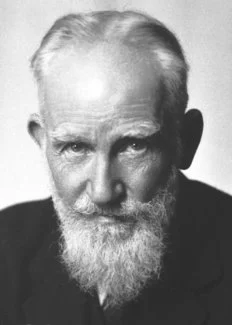
George Bernard Shaw (1856-1950). Photo source: nobelprize.org
George Bernard Shaw, an eminent figure in the world of literature and education, left an indelible mark through his innovative ideas, sharp wit, and profound insights into society. Born on July 26, 1856, in Dublin, Ireland, Shaw’s impact as a playwright, critic, and social reformer remains significant even 74 years after his death. He died on November 2, 1950.
Shaw’s contributions to literature and education have left an enduring legacy. His work is celebrated for its blend of social criticism and comedic brilliance, setting him apart from his contemporaries. He was nothing short of revolutionary. His plays, essays, and critiques not only enriched the literary landscape but also challenged readers and thinkers to reconsider the status quo. Shaw’s dedication to social reform and his advocacy for a progressive education system highlight his commitment to improving society through intellectual and creative means.
As we reflect on Shaw’s life and work, it is clear that his influence extends far beyond his time, shaping both literature and education in ways that continue to inspire and provoke thought. He broke new ground with his plays. and one of his most notable achievements is his development of the “Shavian” play, which often combined elements of satire, social commentary, and wit.
Shaw’s plays are a testament to his genius. “Pygmalion” (1913), perhaps his most famous work, is a masterclass in character development and social critique. The play explores themes of class and identity through the transformation of Eliza Doolittle, a flower girl, into a refined lady. Its impact was so profound that it was adapted into the popular musical “My Fair Lady.” Another significant play, “Saint Joan” (1923), depicts the life of Joan of Arc with a mixture of reverence and scepticism, demonstrating Shaw’s skill in addressing complex historical and moral questions.
Beyond his plays, Shaw’s incisive critiques and essays further cemented his place in literary history. His essays on drama and society often challenged conventional views, pushing readers to reconsider established norms. Shaw’s contributions to criticism were not limited to literature; he was also a vigorous critic of politics, economics, and social issues.
His influence extended beyond the realm of literature into the field of education and social reform. His commitment to these causes was evident in his efforts to improve society and promote intellectual growth. He was an advocate for educational reform, believing that traditional education often stifled creativity and critical thinking. He was an outspoken proponent of a more progressive education system that would foster independent thought and a deeper understanding of social issues. Shaw’s educational philosophy was rooted in his belief that education should not merely transmit knowledge but also inspire and challenge students to think critically about their world.
Activism was deeply intertwined with Shaw’s literary work. He used his platform to address pressing social issues such as poverty, gender inequality, and workers’ rights. As a member of the Fabian Society, Shaw worked towards creating a more just society through gradual reform rather than revolutionary upheaval. His writings often reflected his commitment to these causes, blending his literary prowess with a strong sense of social responsibility.
The Legacy of Shaw’s Ideas
Shaw’s legacy in education is evident in the continued relevance of his ideas. His belief in the transformative power of education and his critique of societal norms continue to resonate with educators and reformers. His works are studied not only for their literary value but also for their profound insights into human nature and society.
Major Contributions of George Bernard Shaw:
1. Innovative Playwriting
• “Pygmalion” (1913): A seminal work exploring themes of class and identity through the transformation of Eliza Doolittle.
• “Saint Joan” (1923): A dramatic retelling of Joan of Arc’s life, blending reverence and critical examination.
• “Major Barbara” (1905): Addresses social justice and the complexities of morality within the Salvation Army.
• “Arms and the Man” (1894): A satire on war and romantic ideals, subverting traditional heroism and military glory.
• “The Doctor’s Dilemma” (1911): Critiques medical ethics and the healthcare system, highlighting Shaw’s social commentary.
2. Social Critique and Reform
• Advocate of Socialism: As a prominent member of the Fabian Society, Shaw promoted gradual social reform and criticized capitalism.
• Critique of Class and Gender Inequality: Shaw’s plays and writings frequently addressed issues of social class, gender roles, and economic disparity.
3. Literary Criticism and Essays
• Theatrical Criticism: Shaw’s essays on drama and theatre challenged conventional views and influenced the evolution of modern drama.
• Essays on Social Issues: His writings explored politics, economics, and social justice, contributing to public discourse on these subjects.
4. Educational Reform Advocacy
• Progressive Educational Ideas: Shaw argued for educational reform that emphasized creativity and critical thinking over rote memorization and traditional curricula.
• Support for Women’s Education: He advocated for equal educational opportunities for women, reflecting his broader commitment to gender equality.
5. Influence on Modern Theatre
• Development of the Shavian Play: Shaw’s unique blend of satire, social criticism, and wit influenced modern theatre, encouraging playwrights to explore social issues through innovative storytelling techniques.
• Impact on the Theatre of Ideas: Shaw’s work laid the groundwork for the Theatre of Ideas, which prioritizes intellectual and philosophical exploration over mere entertainment.
6. Public Debates and Advocacy
• Public Speaking: Shaw was a prominent public speaker and debater, addressing issues from social reform to cultural criticism.
• Engagement in Political Discourse: His extensive correspondence with political figures and involvement in public debates influenced contemporary and subsequent political thought.
7. Recognition and Awards
• Nobel Prize in Literature (1925): Shaw was awarded the Nobel Prize for his work as a playwright and his contributions to literature and social thought.
• Oscar Award for “Pygmalion” (1938): The film adaptation of “Pygmalion” won an Academy Award for Best Screenplay, further cementing Shaw’s impact on the arts.
These contributions collectively highlight Shaw’s multifaceted impact on literature, social reform, and education, affirming his legacy as a transformative figure in early 20th-century intellectual and cultural life.
*The writer is a noted author, accredited with having created a revolution in English training In India with the slogan ‘English for all’.






